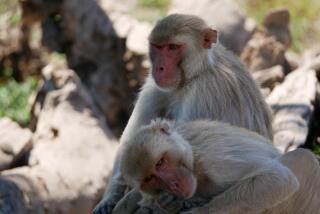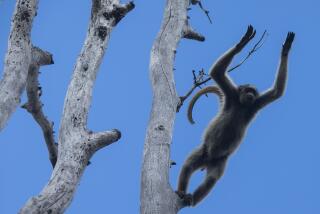Monkey-style âbromanceâ helps macaques weather lifeâs hard knocks
When it comes to weathering the slings and arrows of outrageous fortune, male macaques get by with a little help from their fellow dudes, according to new research.
After getting the stink-eye stare from a dominant male or freezing their tail fur off in a cold cedar forest, male Barbary macaques who bonded with long-time male associates appear to suffer less stress than their loner counterparts, according to a paper published Monday in the journal PNAS.
Such âtend-and-befriendâ coping mechanisms have been documented before in female primates, and among mothers and offspring, but not strictly in groups of males.
âBecause most males compete for opportunities to fertilize females, the focus of studies investigating correlates of male physiological stress have historically been on reproductive competition and hierarchical status,â wrote lead study author Christopher Young, a primate researcher at George-August University in Germany.
Young and his colleagues observed the daily carryings-on of macaques in the Middle Atlas mountains of Morocco, then collected their poop and tested it for the stress hormone cortisol.
The researchers found that macaques who spent time regularly with several fellow male macaques -- either grooming each other or sitting in close proximity or in contact with each other -- had lower fecal glucocorticoid metabolite levels than less social monkeys, particularly after stressful events.
Stress, according to researchers, was mostly commonly caused by a drop in temperature or aggression from competitive males. Aggressive behaviors included biting, chasing, slapping, staring and charging.
âHere we show that in the wild, and similar to females, the social bonds that males form with same-sex group members provide them with a buffer against both naturally occurring social and environmental stressors,â authors wrote.
Follow @montemorin for science news







